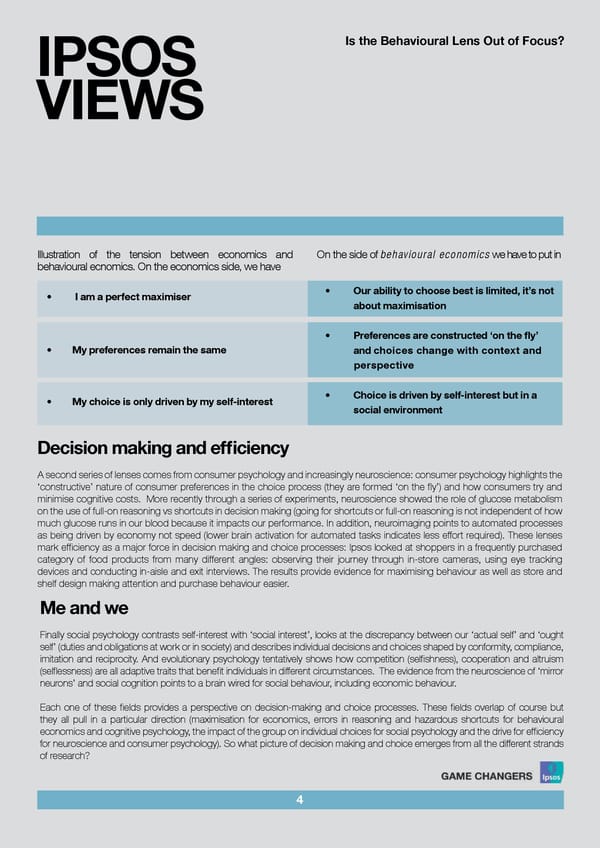IPSOS Is the Behavioural Lens Out of Focus? VIEWS Illustration of the tension between economics and On the side of behavioural economics we have to put in behavioural ecnomics. On the economics side, we have • Our ability to choose best is limited, it’s not • I am a perfect maximiser about maximisation • Preferences are constructed ‘on the fly’ • My preferences remain the same and choices change with context and perspective • Choice is driven by self-interest but in a • My choice is only driven by my self-interest social environment Decision making and efficiency A second series of lenses comes from consumer psychology and increasingly neuroscience: consumer psychology highlights the ‘constructive’ nature of consumer preferences in the choice process (they are formed ‘on the fly’) and how consumers try and minimise cognitive costs. More recently through a series of experiments, neuroscience showed the role of glucose metabolism on the use of full-on reasoning vs shortcuts in decision making (going for shortcuts or full-on reasoning is not independent of how much glucose runs in our blood because it impacts our performance. In addition, neuroimaging points to automated processes as being driven by economy not speed (lower brain activation for automated tasks indicates less effort required). These lenses mark efficiency as a major force in decision making and choice processes: Ipsos looked at shoppers in a frequently purchased category of food products from many different angles: observing their journey through in-store cameras, using eye tracking devices and conducting in-aisle and exit interviews. The results provide evidence for maximising behaviour as well as store and shelf design making attention and purchase behaviour easier. Me and we Finally social psychology contrasts self-interest with ‘social interest’, looks at the discrepancy between our ‘actual self’ and ‘ought self’ (duties and obligations at work or in society) and describes individual decisions and choices shaped by conformity, compliance, imitation and reciprocity. And evolutionary psychology tentatively shows how competition (selfishness), cooperation and altruism (selflessness) are all adaptive traits that benefit individuals in different circumstances. The evidence from the neuroscience of ‘mirror neurons’ and social cognition points to a brain wired for social behaviour, including economic behaviour. Each one of these fields provides a perspective on decision-making and choice processes. These fields overlap of course but they all pull in a particular direction (maximisation for economics, errors in reasoning and hazardous shortcuts for behavioural economics and cognitive psychology, the impact of the group on individual choices for social psychology and the drive for efficiency for neuroscience and consumer psychology). So what picture of decision making and choice emerges from all the different strands of research? 4
 Is the Behavioural Lens Out of Focus? Page 5 Page 7
Is the Behavioural Lens Out of Focus? Page 5 Page 7